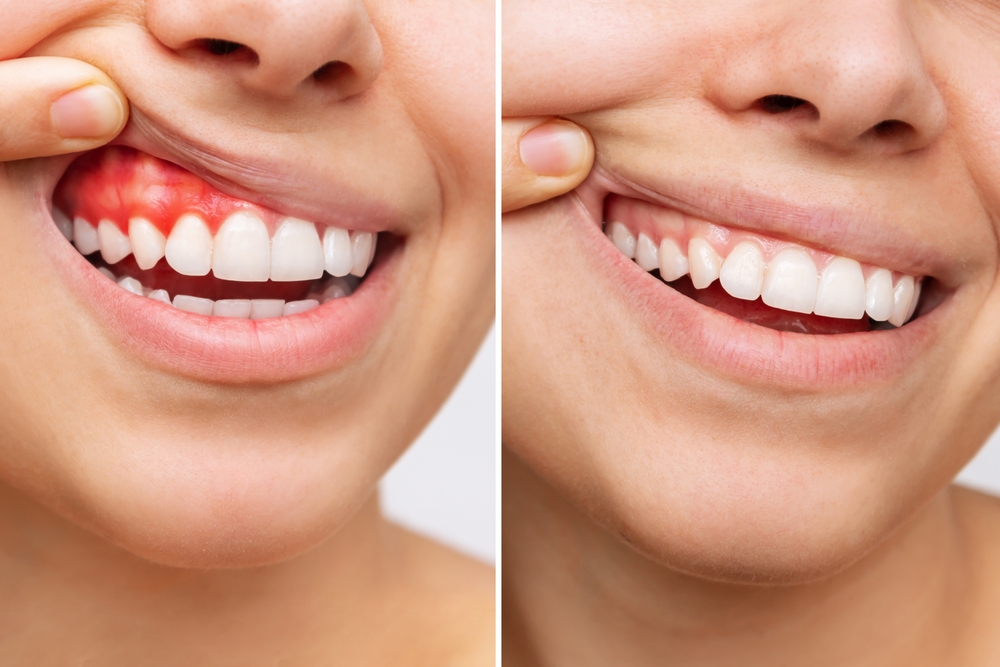Protect Your Smile with Gum Disease Treatment in Waterford, MI
Our experienced Waterford, MI dentist, Dr. Amanda Sheehan, is dedicated to helping patients achieve healthy gums and maintain optimal dental health. The best way to do that is through educating our patients on common dental ailments and their prevention. Gum disease is a common condition that can lead to serious oral health problems if left untreated.
From non-surgical treatments to periodontal surgery, your Waterford dentist customizes her approach to each patient’s unique needs and goals. If you’re in Waterford, White Lake, or Pontiac, and suspect you have gum disease, contact the best dentist in Waterford by calling (248) 674-0384.
What Is Gum Disease?
Gum disease, also known as periodontal disease, is a common and often preventable oral infection that develops from excess bacteria in your gum tissue. It typically starts with the accumulation of plaque, a sticky film of bacteria that forms on your teeth and gums.
When plaque isn’t effectively removed through proper oral hygiene practices like brushing and flossing, it can harden into a substance called tartar or calculus. As plaque and tartar build, bacteria can spread through your gum tissue and cause an infection, increasing your risk for many health issues.
Stages of Gum Disease
Gingivitis
Gingivitis is the earliest and mildest stage of gum disease. It’s characterized by redness, swelling, and bleeding of the gums, especially when you brush or floss. However, in this stage, many patients may not notice any symptoms. Gingivitis is usually reversible with proper dental care, including regular dental cleanings and improved oral hygiene habits.
Periodontitis
If gingivitis is left untreated, it can progress into periodontitis, a more severe form of periodontal disease. With periodontitis, the inner layer of the gum and bone starts to pull away from the teeth, forming pockets. These pockets can become infected, and as the body’s immune system responds, it can lead to the destruction of the supporting structures around the teeth. This can result in tooth mobility, tooth loss, and other complications.


Signs and Symptoms of Gum Disease
If you’re unsure if you have gum disease, look out for these common signs and symptoms, including:
- Red, swollen, or inflamed gums
- Gums that bleed when you brush or floss
- Receding gums, making teeth appear longer
- Persistent bad breath (halitosis)
- Pus between the teeth and gums
- Changes in the way your teeth fit together when you bite
- Loose or shifting teeth
- Tooth sensitivity, especially to hot or cold temperatures
- Formation of pockets or gaps between teeth and gums
- Changes in the fit of dentures or partial dentures
- Persistent metallic or sour taste in the mouth
Preventing Gum disease
With proper maintenance, it’s easy to prevent periodontal disease. Dr. Sheehan offers these tips for stopping infection before it occurs:
- Maintain Excellent Oral Hygiene: Regular and thorough oral hygiene practices are the foundation for preventing gum disease. Brush your teeth at least twice a day with fluoride toothpaste, and use dental floss or interdental brushes to clean between your teeth daily. Proper brushing and flossing help remove plaque and prevent its buildup, a primary cause of gum disease.
- Visit Your Dentist Regularly: Schedule regular dental check-ups and cleanings, typically every six months or as recommended by your Waterford dentist. These visits allow Dr. Sheehan to detect and address early signs of gum disease before it progresses to a more severe stage.
- Quit Smoking and Tobacco Use: Smoking and tobacco use are significant risk factors for gum disease. Quitting can improve your oral health and reduce your risk of gum problems.
- Maintain a Healthy Diet: A balanced diet rich in fruits, vegetables, whole grains, and lean proteins can support your overall health and oral health. Limit sugary and acidic foods and beverages, as they can contribute to plaque formation.
- Manage Stress: Chronic stress can weaken your immune system and make you more vulnerable to gum disease. Practice stress-reduction techniques such as mindfulness, exercise, or relaxation exercises.
- Stay Hydrated: Drinking water helps rinse away food particles and bacteria that can contribute to periodontal disease. It also helps maintain saliva production, which is a natural defense against oral infections.
- Use Antiseptic Mouthwash: Rinsing with an antiseptic or antimicrobial mouthwash can help reduce the bacterial load in your mouth and complement your oral hygiene routine.
- Wear a Mouthguard: If you grind your teeth at night or play contact sports, consider wearing a mouthguard to protect your teeth and gums from injury and excessive wear.
- Check Your Medications: Some medications can affect your oral health. If you’re taking medications that cause dry mouth or have other oral side effects, discuss them with your dentist to find strategies to mitigate potential issues.
- Pregnancy and Menopause: If you are pregnant or going through menopause, pay extra attention to your oral health, as hormonal changes can affect the gums. Consult your dentist for specific recommendations.
Gum Disease Treatments
In cases where gum disease has already taken hold, Dr. Sheehan offers effective treatment options.
Scaling and Root Planing
For those suffering from mild to moderate gum disease, Dr. Sheehan provides root planing and scaling. Root planing and scaling is a non-surgical deep cleaning procedure used to treat periodontal disease.
During the scaling and root planing procedure, your Waterford dentist meticulously removes plaque, tartar, and bacterial deposits from the tooth roots and below the gumline. The scaling and root planing process helps Dr. Sheehan treat gum disease by reducing inflammation and promoting gum tissue healing, preventing the progression of the infection.
Pinhole Gum Surgery
For more advanced cases of periodontal disease, Dr. Sheehan can perform pinhole gum surgery. Pinhole surgery, also known as the Pinhole Surgical Technique (PST), is a minimally invasive procedure for treating gum recession.
Instead of traditional gum grafting, PST involves making small pinhole-sized incisions in the gums and repositioning the gum tissue over the exposed tooth roots. This technique is less invasive, causes less discomfort, and typically results in a quicker recovery than conventional gum grafting methods.
Frequently Asked Questions
Gingivitis, the early stage of gum disease, is often reversible with proper dental care, including regular cleanings and improved oral hygiene. However, advanced stages of periodontal disease, like periodontitis, can be managed but not completely reversed.
Yes, children can develop periodontal disease, usually in the form of gingivitis. It’s essential to teach children proper oral hygiene habits and take them for regular dental check-ups to prevent and manage gum issues.
Yes, gum disease can still develop in some cases, even with diligent oral hygiene. Factors like genetics, certain medical conditions, and medications can increase the risk of gum disease. Regular dental check-ups help detect and address any issues early, even if you maintain good oral care.
Gum disease doesn’t always produce obvious symptoms. Regular dental check-ups are crucial for early detection. Dentists can use measurements and X-rays to assess gum health, even when you may not notice any discomfort or visible signs.
Take the First Step Towards a Healthier Smile
If you have concerns about gum disease or want to explore effective treatment options, don’t hesitate to contact Dr. Sheehan at Oakland Family Dental. Call our Waterford, MI dental office at (248) 674-0384 to learn more about periodontal disease, its impact on your overall health, and our comprehensive treatment solutions.
